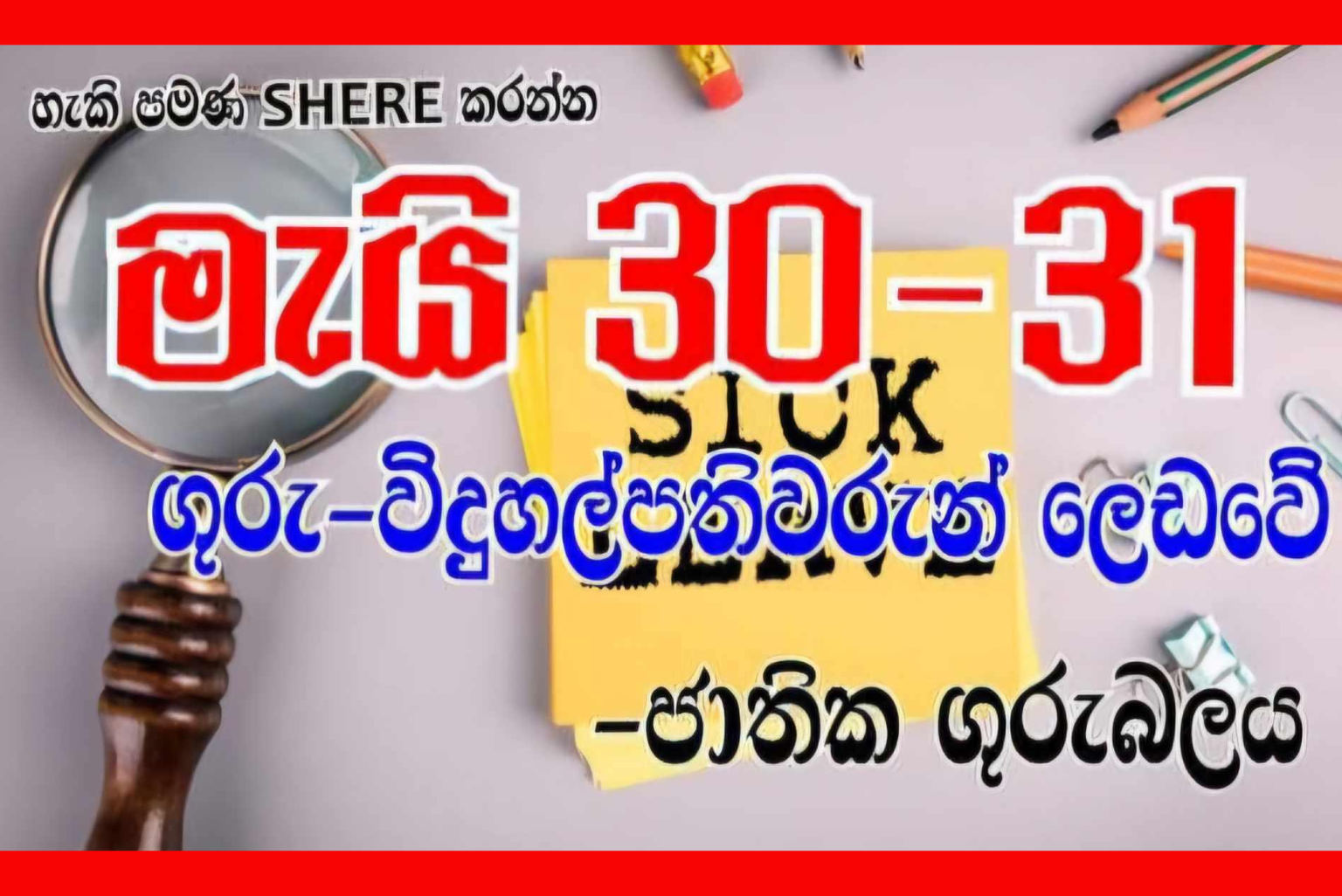Sri Lankan Teachers and principals struggle on 30/31 May

Real Marxists or Socialists never hinder the struggles of the oppressed masses. However, it is
noteworthy that the People’s Liberation Front (JVP) has a history of breaking and disrupting
strikes. In 1980, during JR Jayawardne’s regime, the JVP was famously involved in undermining the
General Strike. During that time, H.N. Fernando, a renowned teacher and trade unionist who was
the leader of the Ceylon Teachers’ Union, received advice from his brother-in-law, Rohana
Wijeweera, the leader of JVP, to abstain from the strike. As a true Marxist, H.N. Fernando resigned
from JVP and took the necessary steps to lead the strike, thus preserving his reputation as a great
trade union leader.
On May 30th and 31st, several teacher trade unions urged their members to take sick leave to
protest the discrepancies in teacher salaries. During this period, the government displayed its fear
for strikes, picketing, and sick leave campaigns. As a result, the JVP teachers’ union and Ceylon
Teachers’ Union attempted to sabotage the movement by claiming that it was a government
conspiracy. Their actions demonstrate how they prioritize safeguarding the government’s
interests.
It is common knowledge that these two unions openly supported the previous UNP-led so-called
“Good Governance” government. The unofficial leader of that government is now serving as the
President of Sri Lanka. Therefore, they may have an aim to protect their ex-boss.
To the current course of action of the Ceylon Teachers’ Union, we assume that it would not have
been credibility for its former leader, H.N. Fernando, who does not alive. Although he had not
betrayed the class struggle in favor of his relatives, the present successors of the union are
reversing his leader’s legacy and selling his credibility. (These criticisms are leveled in order to
correct their errors.)
“We can understand why the JVP trade union is opposing this trade union action. Every action
taken by a trade union affects ordinary people, which is why they are disappointed in
organizations that lead the struggle. With the upcoming election period, it could harm their
dreams of entering parliament. The current JVP teacher trade union leader hopes to stand for the
general election; hence, these ongoing sick leave campaigns may harm his parliamentary journey.
At this point, the stance of “The Joint Teachers’ Service Union” (JVP breakaway faction) is unclear.
They have always boasted about class struggles. However, during this moment, are they part of
the betrayal group? Or are they standing with the common teachers’ side? It will be a litmus test
of the Frontline Socialist Party (breakaway group of the JVP).”
“We must also express our support for the 30/31 campaign and the protest organized by the
Ceylon Teachers’ Union and the Ceylon Teacher Services Union (JVP) on July 26th. Our support is
unconditional, regardless of any sectarian affiliations.”
By undermining teachers’ trade union actions, is it true that these traditional unions stand for
socialism?
Lenin himself did not question who led the struggles that arose during the Tsar period before the
Russian revolution. He emphasized that the Bolsheviks must take the leadership. The struggles led
by other factions were not labelled as traitors or betrayals. Instead, he encouraged bringing
forward the struggles initiated by others against the Tsar regime.
The Ceylon Teacher Services Union claims to belong to a socialist party, while the Ceylon Teachers
Union states that they also accept self-determination rights and identify as socialists. However,
the struggle undertaken by teachers to address their salary anomalies on May 30/31 was inspired
and carried out without the involvement of these traditional trade unions. Consequently, these
unions have taken various measures to undermine the struggle. At one point, they attributed the
leadership of this struggle to the main opposition SJB, disregarding their own affiliation with a
political party. They have made several statements aimed at undermining a struggle that they did
not lead, openly expressing their lack of support for movements not under their own leadership.
Furthermore, they have claimed that these struggles are not intended to fulfill the demands of
teachers. One may question whether these actions align with their professed belief in Marxism.
Despite these obstacles, the sick leave campaign led by 14 teacher and principal unions achieved
unexpected success. However, the participation from the Western Province, as well as the North
and East provinces, was relatively poor. This can be attributed to weak communication, as the
message did not effectively reach teachers working in the North and East regions. The school
closures in the Western Province were minimal, with only about 40% reporting sick leave success.
Similar trends were observed in the North Central province and Northeast provinces. In contrast,
in the Southern and Sabaragamuwa provinces, approximately 80% of schools were closed down.
The Southern Province is claimed to be a stronghold of the JVP political party. In the Central
Province, most major schools were closed, particularly in the Kandy District where the campaign
succeeded. Approximately 50% of teachers across the island reported sick leave, affecting the
remaining schools.
The success of the teachers and principals’ sick leave campaign, despite the opposition from major
traditional teachers’ unions and the government, can be attributed to several key factors. Firstly,
the teachers and principals are facing severe cost of living challenges due to salary anomalies,
which has created a pressing need for a solution to their dire needs. They prioritize addressing
their demands above any consideration for leadership or affiliations. Secondly, their main
objective is to achieve success in fulfilling their demands. Thirdly, the monopoly of traditional
trade unions has been undermined, with teachers recognizing that these unions prioritize the
needs of their political parties rather than genuinely addressing their demands.